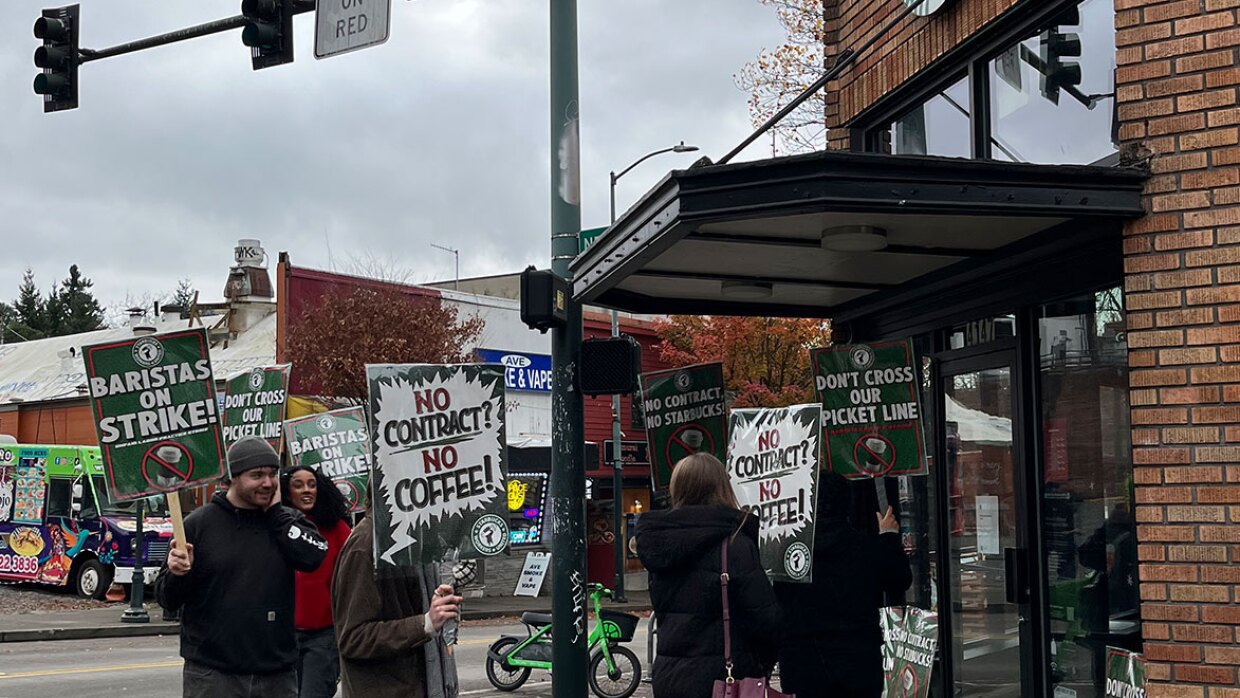At a Starbucks store near the University of Washington campus, baristas have been keeping the doors to the cafe closed. Signs with the slogan “No Contract? No Coffee!” line the entrance as the baristas stand outside, picketing. They’re part of over 1,000 Starbucks employees across the country who are on strike.
“We are striking until the company gives us what we want,” said Emma Cox, who has worked at the coffee company for seven years.
Cox is a member of Starbucks Workers United, the union that represents employees at over 640 Starbucks locations.
Members at 65 stores started a picket on Nov. 13, in an attempt to call attention to unfair labor practices the union has alleged against Starbucks. The beginning of the strike coincided with the company’s Red Cup Day, where customers who order one of the company’s holiday beverages receive a free reusable cup.
A Starbucks spokesperson, Jaci Anderson, responded to a request for comment with a statement, which read in part, “We’re disappointed that Workers United, who represents less than 4% of our partners, called for a strike instead of returning to the bargaining table. Less than 1% of our coffeehouses have experienced any level of disruption, and the vast majority of our 240,000 partners are coming to work ready to serve customers.”
Starbucks Workers United and the company have yet to reach a collective bargaining agreement, four years after the first store unionized. Bargaining came to a halt in December 2024, after the union said the company failed to bring forward a serious economic proposal. The union has filed a complaint, alleging the company has refused to bargain in good faith.
Starbucks said that the union walked away from bargaining.
“We’ve been very clear — when the union is ready to come back, we’re ready to talk,” Anderson said in an emailed statement.
Sarah Kelly, the company’s chief partner officer, released a statement on Nov. 5 after the union authorized a strike, highlighting the company’s benefits to workers that include health care, tuition coverage for a four-year college degree, and up to 18 weeks of paid family leave, all starting at roughly 20 hours per week.
But in a November memorandum, the union said the average barista gets less than 20 hours per week. Starting wages begin at $15.25 an hour for many baristas in the U.S.
“The union knows exactly how to make this company a better place. It's to make your workers happy,” Cox said. “It's to make them feel respected, to pay them enough and then the rest will come.”
Cox said members are fed up with Starbucks not meeting their priorities for liveable wages and better staffing.
“Seattle is built on our labor, and it's time that we feel that benefit of just all the work that we've done,” Cox said.
The union is asking people to sign a petition, agreeing not to visit Starbucks stores while members are on strike.
The union has said the strike is indefinite. Seattle members have been raising money to try and support workers while they withhold their labor.
Dues-paying members to Starbucks Workers United contribute to a strike fund that will be offered to striking workers, Cox said.


